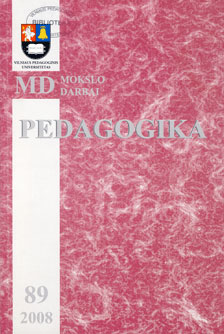Instrumentinis muzikavimas kaip etninio ir kultūrinio tapatumo ugdymo būdas
Playing instrumental music as away of developing ethnical and cultural identity
Author(s): Vida PalubinskienėSubject(s): Education
Published by: Vytauto Didžiojo Universitetas
Keywords: playing instrumental music; ethnical and cultural identity; youth; school; educator.
Summary/Abstract: One of the basic objectives of contemporary pedagogy is developing youth's national musical culture. In the course of history, when the idea of Lithuanian independence used to become realistic and tangible, special attention was paid to identity issues. The efforts to sustain and to thoroughly foster our traditions, customs, language and ethnical music had the greatest impact on the development of Lithuanian people's national awareness. The essential categories characterising the Lithuanian national identity have been and remained self-awareness, language, customs, folk art, and ethnical instruments. The Lithuanian traditional instrument, kanklės (zither) has been chosen as one of the above-described symbols of identity. For individuals, identifying oneself with a kanklės has become a feature expressing national identity and cultural distinction. Playing instrumental music in ensembles using ethnical instruments (especially the kanklės) has also greatly contributed to preserving of Lithuanian traditions and national identity, as a way of national awareness. The traditions of playing instrumental music in ensembles are quite old and deep-rooted in Lithuania. Ethnical instruments (the kanklės, reed-pipes, pan flutes, etc.) have been always regarded as a symbol of national awareness. Therefore, continuity and dissemination of related traditions and their application in various aspects contributes, at least partially, to the possibility of preserving national values and developing national identity. Playing instruments in ensembles helps young people develop their musical listening skills and memory, get more matured spiritually, as well as form aesthetic feelings and artistic understanding of music. For educators, the ability to play different ethnical instruments is helpful in the respect of having more variety in their classes, involving the learners in extracurricular activities, and making closer acquaintances with the pupils and their parents. The possibility to develop the national identity of young people by means of playing in ensembles is exploited not only in Lithuania. This kind of experience has been used quite long in the practices of other countries (e.g. playing zithers in ensembles in Finland). Therefore, in the rapid course of globalisation processes, it is of great importance to educate the young generation in the spirit of national traditions.
Journal: Pedagogika
- Issue Year: 2008
- Issue No: 89
- Page Range: 139-144
- Page Count: 6
- Language: Lithuanian

